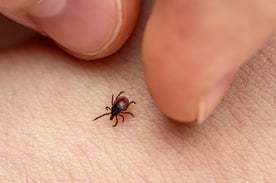Organizations that provide summer care for school-aged children often spend a lot of time outdoors, including camps where almost the entire day and possibly night is spent outside. This means an increased risk for tick bites and tickborne illnesses, including Lyme Disease. Lyme Disease can be serious and have long-term effects on a child if it’s not treated promptly. Camps and other child-focused organizations need to protect children as best they can from tick bites. 
Tick facts
Ticks are small insects that are most active during the warmer months of the year. They are found in grassy or heavily wooded areas and attach themselves to whatever animal or person who brushes by. Typically tick bites aren’t very painful; however, ticks can carry serious diseases. Ticks can also often be difficult to remove as they burrow into the skin. The CDC’s website has specific tick removal tips. The Centers for Disease Control and Prevention (CDC) has an in-depth tick website with information on how to prevent tick bites and remove ticks as well as the various illnesses that ticks can carry.
Tick bite prevention
Tick bite prevention can be a little more challenging for organizations responsible for large groups of children during the summer. Checking for ticks on clothing or visible areas of skin after time spent outside in grassy areas or in the woods is a great way to find ticks before they are attached. Encourage parents to check their children more thoroughly at the end of each day or at the end of their camp stay. Parents can also provide a bug spray containing DEET to repel ticks. Organizations should also provide parents with information on what types of rashes to look for just in case a child is bitten and develops a tickborne illness. Finally, ensure that parents are notified if a tick is found imbedded in a child’s skin and removed. They’ll want to monitor their child and potentially take them to the doctor.





